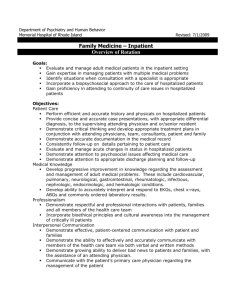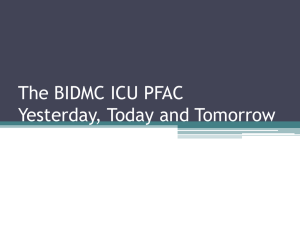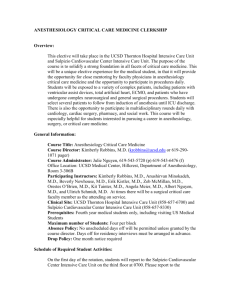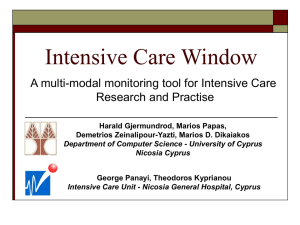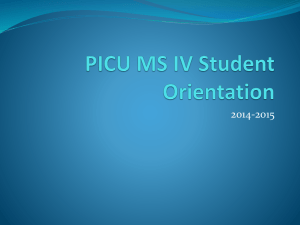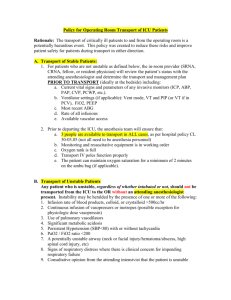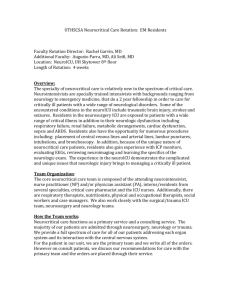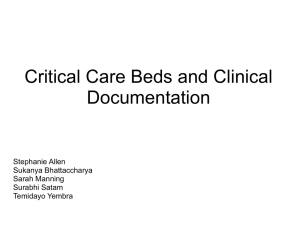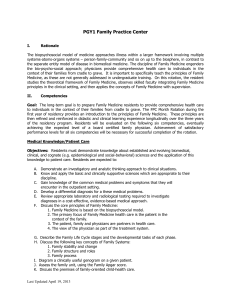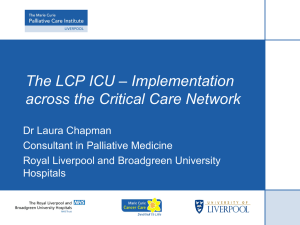Rotation: Medical intensive care unit (south campus) for interns and
advertisement
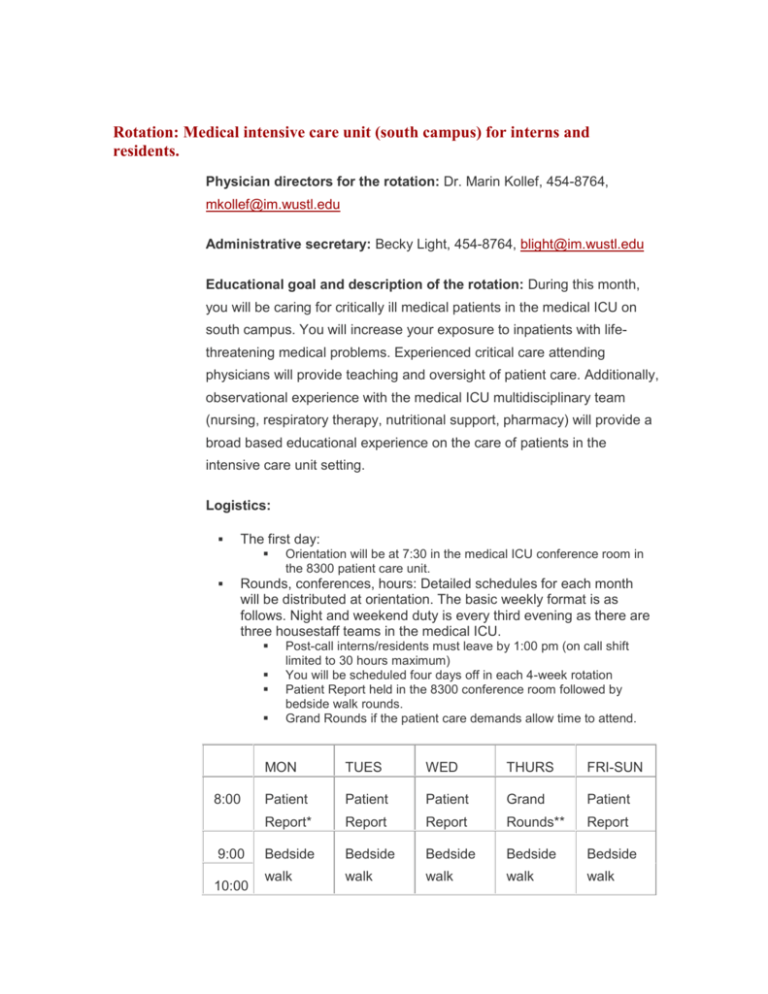
Rotation: Medical intensive care unit (south campus) for interns and residents. Physician directors for the rotation: Dr. Marin Kollef, 454-8764, mkollef@im.wustl.edu Administrative secretary: Becky Light, 454-8764, blight@im.wustl.edu Educational goal and description of the rotation: During this month, you will be caring for critically ill medical patients in the medical ICU on south campus. You will increase your exposure to inpatients with lifethreatening medical problems. Experienced critical care attending physicians will provide teaching and oversight of patient care. Additionally, observational experience with the medical ICU multidisciplinary team (nursing, respiratory therapy, nutritional support, pharmacy) will provide a broad based educational experience on the care of patients in the intensive care unit setting. Logistics: The first day: Orientation will be at 7:30 in the medical ICU conference room in the 8300 patient care unit. Rounds, conferences, hours: Detailed schedules for each month will be distributed at orientation. The basic weekly format is as follows. Night and weekend duty is every third evening as there are three housestaff teams in the medical ICU. 8:00 9:00 10:00 Post-call interns/residents must leave by 1:00 pm (on call shift limited to 30 hours maximum) You will be scheduled four days off in each 4-week rotation Patient Report held in the 8300 conference room followed by bedside walk rounds. Grand Rounds if the patient care demands allow time to attend. MON TUES WED THURS FRI-SUN Patient Patient Patient Grand Patient Report* Report Report Rounds** Report Bedside Bedside Bedside Bedside Bedside walk walk walk walk walk 11:00 11:30 rounds rounds rounds rounds rounds Radiology Rounds at computer terminal in 8300 conference room 12:00 NOON CONFERENCES 13:00 14:00 15:00 16:00 -0730 Patient Patient Patient Patient Patient care and care and care and care and care and procedure procedure procedure procedure procedure s s s s s Educational purpose (curriculum): Educational purpose: The main goal of the medical ICU rotation is to provide house officers experience in the management of patients with a wide variety of critical illnesses, including initial evaluation and continued management of critical illnesses throughout the patient’s stay in the ICU. This includes the following objectives: To learn to recognize and respond to common medical emergency syndromes. To learn to organize and manage a clinical database relevant to critically ill patients. To develop clinical skills in procedures commonly employed in and out of the medical ICU setting All of the Competency Milestones are pertinent to this rotation. Areas of special focus are noted below. Interns should be able to be able to develop a basic level of competence in the skills listed. JARs should be able to perform the skills with less supervision, at a higher level (e.g., elicit subtle physical findings), in multiple patients and in more complex patients. SARs should be almost independent in these skills, and able to deal with unexpected events and ambiguous situations. Patient Care Medical Knowledge Demonstrate an increasing fund of knowledge in the range of common problems encountered in the medical ICU and utilize this knowledge in clinical reasoning. Residents will learn to diagnose, understand the pathophysiology and know the differential diagnosis as well as manage: Septic shock Acute renal failure Diabetic ketoacidosis/hyperosmolar state Toxidromes and withdrawal states Pulmonary embolism Nosocomial infections Acute gastrointestinal hemorrhage Hypertensive emergencies Respiratory Failure ARDS Cardiopulmonary arrest By the end of this rotation, you should understand the indications for, interpretation of data from and complications related to the following in the appropriate situations: Swan-Ganz catheterization Non-invasive ventilation Pressure-cycled ventilation Vasoactive drugs Residents will demonstrate an increasing ability to teach others Practice-based learning and improvement Gather accurate information about patients, including performing a thorough history and physical examination Synthesize data into a prioritized problem list and differential diagnosis, then formulate diagnostic and therapeutic plans Monitor and follow up patients appropriately Appropriately document patient status, test results, diagnostic impressions and therapeutic plans in a daily problem-oriented progress note Prioritize each day’s work (intern for self, resident for entire team) Know the indications, contraindications, and risks of certain invasive procedures, including arterial line insertion and central venous line insertion, and competently perform such appropriate invasive procedures when indicated. More advanced residents (PGY2 or 3) should also know the indications, contraindications and risks of bedside right heart and pulmonary artery catheterization and competently participate in supervised SwanGanz catheter insertion when indicated. All interns and residents should understand his or her limitations of knowledge and judgment; ask for help when needed; and be self motivated to acquire knowledge Accept feedback, learn from own errors and develop selfimprovement plans Use information technology to manage information and access online medical information JARs and SARs should learn how to use knowledge of study designs and statistical methods for the critical appraisal of clinical studies, and how apply to this information to the care of patients Interpersonal and communication skills Professionalism Demonstrate caring and respectful behaviors with patients, families, including those who are angry and frustrated; and all members of the health care team Counsel and educate patients and their families Conduct supportive and respectful discussions of code status and advance directives Facilitate the learning of students and other health care professionals Demonstrate ability to convey clinical information accurately and concisely in oral presentations and in chart notes Demonstrate respect, compassion, and integrity Demonstrate a commitment to excellence and on-going professional development Demonstrate a commitment to ethical principles pertaining to provision or withholding of clinical care, confidentiality of patient information, informed consent, and other aspects of clinical care Develop an appreciation for the ethical, cultural and socioeconomic dimensions of illness, demonstrating sensitivity and responsiveness to patients’ culture, age, gender, and disabilities Residents should display initiative and leadership; be able to delegate responsibility appropriately Systems-based practice Work effectively with others (such as nurses, secretaries, interpreters, technicians) as a member of a health care team Advocate for quality patient care and assist patients in dealing with system complexities Understand and appreciate the importance or contacting the patient’s primary care provider at the time of admission of soon thereafter Residents should develop proficiency in leading the health care team, organizing and managing medical care Learn the cost-effective use of diagnostic and therapeutic technology Teaching Methods: Progressive, graduated responsibility for the performance of the admission history and physical examination, formulation of diagnostic and therapeutic plans, writing of orders, continued care while in the intensive care unit, and performance of bedside procedures, all under the supervision of the attending physician. Attending teaching rounds including bedside interaction with the patient and demonstration of clinical skills by the attending physician. Additionally, exposure to the performance of specific procedures performed in the intensive care unit, as well as management of technologies and medications usually employed in the ICU setting. Lastly, review of autopsy report on all of the residents’ expired patients who have undergone post-mortem examination. Ancillary educational material methods: MICU library of textbooks. The MICU has computer workstations with Medline search capability and internet access to Medline and numerous on-line books and journals. UpToDate is recommended as a concise peer-reviewed source for on-the-spot information. Residents are encouraged to go to the original literature for more in-depth learning Washington University (Becker) medical library. Critical care didactic lecture series provided twice monthly. Monthly critical care nursing lecture series. Method of evaluation of resident performance: Resident evaluation: House officer evaluation forms, completed by attending physician on the web-based program (MyEvaluations), with verbal feedback to the house officers at the mid-point and end of the rotation Peer Evaluations The use of the mini-CEX (clinical evaluation exercise) is encouraged during this rotation (4 CEXs per year are required) The nursing staff will evaluate each house officer’s humanistic qualities Rotation and attending evaluation: attending and rotation evaluation forms completed by residents based on quality of educational experience. House staff liaison committee, consisting of house staff representatives who meet regularly with program directors to present house staff comments and criticisms. Semi-annual feedback session with program directors. The mix of diseases, patient characteristics, and types of clinical encounters, procedures, and services: House officers rotating in the MICU will be exposed to a broad mix of diseases: a variety of critically illnesses, including respiratory failure, sepsis, gastrointestinal hemorrhage, etc. Patient characteristics: private and nonprivate patients of both sexes in a wide range of ages, including patients referred for intensive care from a wide geographic area. Types of clinical encounters: intensive care unit admission evaluations and continuing intensive care. Procedures and services: evaluation and treatment of acute medical problems, including endotracheal intubation, mechanical ventilation, central venous access, arterial catheterization, etc. Resident supervision: Every patient encounter in ICU must be presented to an attending physician, the attending physician will most often be the medical ICU attending physician but can be a subspecialty attending or the patient’s attending physician. The Attending physician is available 24 hours per day by pager for any questions or issues regarding medical ICU patients.
